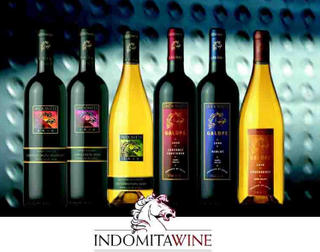TTAB Query: "QUINTUS" and "QUANTUM" Confusingly Similar for Wine?
Quite unsurprisingly, the Board quenched the attempt of Chatam International to quash an application to register QUINTUS for wine, an attempt predicated on the Opposer's clearly questionable assertion of confusing similarity to QUANTUM for wine. Chatam Int'l Inc. v. Indomita Wine, S.A., Opposition No. 91155603 (August 24, 2005) [not citable].

Because the goods involved are identical, the Board observed that the degree of similarity in the marks necessary to support a finding of likelihood of confusion is diminished. It sliced and diced the marks in question, picked them apart, and held up the pieces to its collective, discerning eye.
The Board agreed with Opposer's astute observation that the marks have "certain letters in common," but it rejected Opposer's cock-eyed contention that the "QU" combination is unusual and eye-catching. The trademark tribunal authoritatively observed: "'Q' is one of the letters of the western alphabet, and it almost always requires the letter 'U' as the letter following the 'Q.'"
The Board recognized that each mark has seven letters, begins with the letters "QU," and has the letters "NTU" in the middle, but it also cleverly pointed out some differences: "their initial vowel, the third letter, is a different vowel and the final letter is different."
As to pronunciation, Opposer asserted that "five of the seven sounds in 'QUINTUS' are identical to five of the seven sounds in 'QUANTUM.'" Then Opposer got quite fancy:
"Finally and equally important, both 'QUANTUM' and 'QUINTUS' have the same morphemic structure. A morpheme is a minimal meaningful unit. In both cases, there is a morphemic root, 'QUANT' in one case, 'QUINT' in the other, and a morphemic suffix 'UM' in the one case, and 'US' in the other."
The Board, however, side-stepped Opposer's attempt to inject morphemes into the deliberations, and instead cut to the chase: "Ultimately, ... the marks would not sound very similar."
As to meaning, the word quantum is defined as "amount," while quintus is defined as the "fifth voice in medieval music." The Board recognized, however, that most people would be unaware of the dictionary definition of quintus, and would likely view it as a Latin-sounding word, perhaps associating it with the word "quint," meaning fifth. Consequently, our favorite tribunal concluded that the meanings would not be similar.
Finally, the Board found that the commercial impressions of the marks would not be similar: Opposer's mark would be recognized as the English word "quantum," while the unusual term "quintus" would be seen as an arbitrary term or a term with a Roman or Latin connotation.
In sum, the Board acknowledged some similarities between the marks, but the differences in pronunciation, appearance, meaning, and commercial impression outweighed the similarities.
Q.E.D.
Text Copyright John L. Welch 2005.




0 Comments:
Post a Comment
<< Home